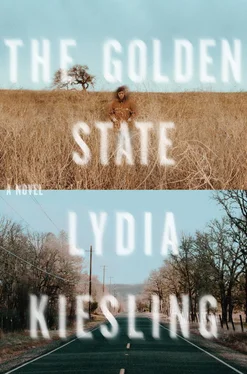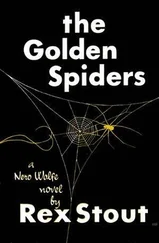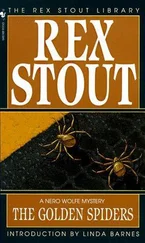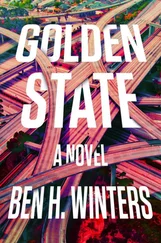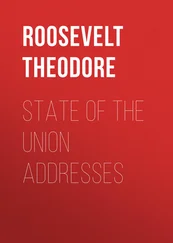Lydia Kiesling - The Golden State
Здесь есть возможность читать онлайн «Lydia Kiesling - The Golden State» весь текст электронной книги совершенно бесплатно (целиком полную версию без сокращений). В некоторых случаях можно слушать аудио, скачать через торрент в формате fb2 и присутствует краткое содержание. Город: New York, Год выпуска: 2018, ISBN: 2018, Издательство: MCD, Жанр: Современная проза, на английском языке. Описание произведения, (предисловие) а так же отзывы посетителей доступны на портале библиотеки ЛибКат.
- Название:The Golden State
- Автор:
- Издательство:MCD
- Жанр:
- Год:2018
- Город:New York
- ISBN:978-0-374-71806-0
- Рейтинг книги:5 / 5. Голосов: 1
-
Избранное:Добавить в избранное
- Отзывы:
-
Ваша оценка:
- 100
- 1
- 2
- 3
- 4
- 5
The Golden State: краткое содержание, описание и аннотация
Предлагаем к чтению аннотацию, описание, краткое содержание или предисловие (зависит от того, что написал сам автор книги «The Golden State»). Если вы не нашли необходимую информацию о книге — напишите в комментариях, мы постараемся отыскать её.
The Golden State — читать онлайн бесплатно полную книгу (весь текст) целиком
Ниже представлен текст книги, разбитый по страницам. Система сохранения места последней прочитанной страницы, позволяет с удобством читать онлайн бесплатно книгу «The Golden State», без необходимости каждый раз заново искать на чём Вы остановились. Поставьте закладку, и сможете в любой момент перейти на страницу, на которой закончили чтение.
Интервал:
Закладка:
Then we spent four years in a humid house in Arlington, VA, before he was reassigned to Athens. And then one home leave, while Mom and I were visiting my grandparents in the mobile home Honey and I are occupying now, he took a little holiday after squiring around a delegation of some sort—Greek? American?—to Bulgaria, and got on a bus which somewhere between Sofia and Varna careened off the road with him inside. Mom and my grandpa flew to Sofia, where a hapless consular officer on his first tour, whose job was typically limited to issuing visas and consoling the pickpocketed, who had a tiny piece of toilet paper stuck to his razor-scraped face in my mother’s vivid retelling, handed over a small canvas duffel with urn inside and held her hand and cried. We vacated our government-provided housing but stayed in Athens for two more years in a kind of paralysis until she sold the house in Arlington and moved back to the Golden State. His federal death benefit sustained her while she went back to school for her M.A.; the house money almost paid for me to go to an expensive high school and college in the muggy-in-summer-frigid-in-winter northeast; everything else covered her expenses when she was sick. I got a benefit too courtesy of Uncle Sam, and I spent it mostly unwisely, except it did buy my first plane ticket to Turkey.
Hence my remaining inheritance is the stuff in the garage, and the mobile home, which my grandparents quietly vacated by their deaths two years before my mother died, all of those deaths—their deaths and hers—taking place in my early-to-mid-twenties, which blurs together now as a time of both dealing with things and not dealing with things, a lot of logistics, the logistics of death mostly, and various bad jobs and blackouts and bad flings, until I started the stupid Ph.D.
I think, but don’t know, that my father would have appreciated my marrying a Turk, although his personal feeling always lay with the Greek side; he and Mom were modern-day Philhellenes. It was Constantinople to them. My mother I suspect would not have appreciated it since when I first went to Turkey she explicitly instructed me not to marry a Turk, as though that were the likeliest outcome of any trip. She believed in “East” and “West,” what we at the Institute know to be false categories, like “Clash of Civilizations,” like “Middle East.” She thought like ought to marry like, I think. But Engin and I are like, sort of, and she would have gotten over it, I know it. She would have liked him. She would have liked Ayşe and Pelin. And Honey! Well. The ideal child.
Honey isn’t her real name, I sometimes do and sometimes do not explain to the people who ask about it. Her real name is Meltem, which is a summer wind that blows in Greece and Turkey alike. When Engin and I decided to get married I was in my secret heart of hearts very excited to be able to have a baby with a beautiful Turkish name. I know this is Orientalist but I think anyone who learns Turkish is helpless against the names, because often they mean things, and not like English where you search Babynames.com and find out a name maybe possibly meant “Brave” in ancient Frisian or whatever, but tangible everyday meanings, like “Sea” or “Life” or “Horizon” or even phrases—Engin has a friend named “Take revenge.” Anyway, we came up with Meltem, which is geographical and allegorical and alliterative. Meltem Mehmetoğlu. But when she was a baby I started calling her Melly in my singsong new-mom voice, and meli means “honey” in Greek, and then somehow I started calling her Honey, and Engin started doing it too sometimes, so now the baby I was so eager to name in Turkish has an American stripper name. But it’s a secret tribute to my parents, who both spoke Greek. And it suits her. She is full of warm golden light. Although she is forceful too, I guess, like a wind. Honey Mehmetoğlu. You aren’t going to forget her name, at any rate.
We arrive at the cemetery sweating—or I’m sweating, Honey pink in the cheeks but shrouded by her stroller. The road slopes gently upward so that the cemetery is perched on a sort of plateau, with a view of the flat plain and the bird refuge and the mountains in the distance, and a little church made of black volcanic stone at its back. There are a number of modest mausoleums built out of this black volcanic stone, all the way to the mid-1800s which passes for old here. The Burdocks, that is us, don’t have a mausoleum, just flat stones, nothing flashy: my grandmother and grandfather and my grandmother’s grandmother and grandfather and that grandmother’s mother and father. We find my mom’s stone, next to her parents. My dad, weirdly, upsettingly, does not have a stone here but lives in an urn in the garage of the mobile home because my mother could never figure out where she wanted him to go, and she knew he hated Altavista and wouldn’t want to be up here, but also didn’t want to put him down below in the South Bay where he was born; his family was as small as hers. I pause to feel guilty that I have not repatriated him at least to my apartment. “Beloved Mother,” Mom’s stone says, my idea. I take Honey out of the stroller and she sits down on the grass next to Mom. “Hi Mom,” I say. Honey is pulling blades of grass out of the ground, delighted. “Do you see Honey?” I ask. “The last time she was here she was just a little squirt.”
I think back to that visit, which is when my mother-in-law came to visit a month after Honey was born, bringing along Engin’s niece, Pelin’s daughter, the teenaged Elifnaz who was wild to see America. This being Ayşe’s first visit not only to our home but to America I felt it could not simply be a meet-the-baby help-the-mother visit but had to be an elaborate exhibit of all the best America had to offer and I made it nightmarish by trying to cram in too many things. But first, when they arrived, I suddenly missed my mother so desperately I had to spend a day in bed, pleading illness, letting them take the baby and coo to her and whisper in hushed tones in the adjacent room. Then I recovered and it was showtime. Every time Ayşe and I have two glasses of wine together and I let loose the floodgates of my stilted Turkish we agree that there can be no ostentatious display of hospitality among family. But to me Ayşe’s default mode of just finding a few snacks around the house to put out feels so elegant, so finely wrought, that I cannot believe her when she says it’s no trouble at all. And she does this on top of running her own small but robust accounting business. My mother also reflexively put out snacks, prepared things, gave gifts, wrote notes, and I saw that those things were trouble to her, necessary trouble that gave her pleasure but took up her time, and the result was still less than what some Turkish women come up with when they are going all out. Whatever muscle I have in that department is weak and rubbery, but the urge is there—the worst combination. So that meant when they came there was the rental of an Airbnb in the City in a nicer neighborhood than ours, the price of which somewhat exceeded our ability to pay for it, and the arranging of a variety of outings, for wine tasting, for a boat to Alcatraz, for a hike at Point Reyes, and finally, although it boggles my mind and shames me to think of it now, a trip to Altavista so they could see “the real West.”
Whatever misgivings my mother might have harbored about my irrevocably tying my fortunes up with a foreigner I knew she would have helped me finesse the visit, she would have pointed out the folly of taking them to Paiute, would have instead had them to her rented bungalow in Sacramento, would have suggested a weekend in Tahoe rather than two awkward nights in the mobile home and a chilly picnic lunch at Fort Bintner, where, I explained, by no means clear any longer on the details, how my great-great-great-grandparents cruised down the Emigrant Trail, got turned around between Shasta and Lassen, and for some reason decided to stay. In middle school I had to do a report about my hometown and since I didn’t really have one I picked Altavista, and my grandmother mailed me copies of all her historical society tracts and some in retrospect extremely one-sided accounts of the Indian Wars and I stood in front of the class with my poster board and my diorama showing rodeo riders and told them my problematic inherited narrative of the west. Some details from the report stay in my mind and I attempted to reinterpret them for Engin’s family. “No European saw this land until the 1820s,” I told them, which now seems remarkable, that we colonizers are such a waterbug on the surface of this territory, temporally speaking, yet so destructive. For the whites it was meant to be a way-crossing, more people coming through the pitiless basins on the way to something else than sticking around. The ones who did stay wanted to be left alone except when they needed the army to subdue the Paiutes the Modocs the Pit River the Klamath the Hat Creek upon whose land they were squatting. And once the Paiutes etc. were murdered or shipped to Oklahoma or crammed into the nation’s smallest reservations, the victors couldn’t even agree what to call the land or how to apportion it—Utah, Nevada, Mormon Deseret, California, endless territory names, endless proposed states and administrative divisions, endless skirmishes, with the fractious settlers rejecting every tax levy until they wanted something. The land was always being renamed and redrawn. Finally they carved off this tiny, least-inhabited county, assigned it once and for all to California, and gave it the name of their one-time enemy, out of scorn or fetish I don’t know.
Читать дальшеИнтервал:
Закладка:
Похожие книги на «The Golden State»
Представляем Вашему вниманию похожие книги на «The Golden State» списком для выбора. Мы отобрали схожую по названию и смыслу литературу в надежде предоставить читателям больше вариантов отыскать новые, интересные, ещё непрочитанные произведения.
Обсуждение, отзывы о книге «The Golden State» и просто собственные мнения читателей. Оставьте ваши комментарии, напишите, что Вы думаете о произведении, его смысле или главных героях. Укажите что конкретно понравилось, а что нет, и почему Вы так считаете.
